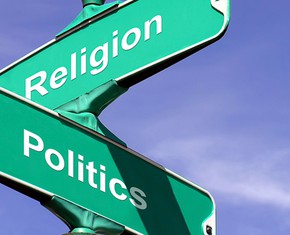The views expressed in our content reflect individual perspectives and do not represent the authoritative views of the Baha'i Faith.
I enjoy talking with friends and acquaintances, and I find it particularly exciting when, in the course of the conversation, we come across fundamental questions about life.
In every philosophy of life, the question of a Creator still occupies a significant position today. Thus, a believer, regardless of his or her concept of God, will usually evaluate and shape his or her life differently than a non-believer.
Because this “God question” shapes us more than we often realize, discussions about it can be very emotionally charged. I have frequently experienced, when the question of a Creator comes up, how a relaxed discussion situation can be overturned from one moment to the next. Someone quickly feels offended because, for example, what he believes is labeled as an outdated superstition. If he then defends himself, a dispute arises and an objective discussion is hardly possible.
In my experience, the most successful way to deal with the complex God question is to approach it step by step.
RELATED: The Greatest Proofs of the Existence of God
Can the Existence of God Be Disproved?
Is it possible to convincingly disprove the existence of a Supreme Being? The five most well-known arguments against the idea of one Creator are:
1. God is not visible
2. God is just the wishful thinking of man
3. the Holy Scriptures contradict reality
4. the “God of the gaps” argument
5. the problem of evil (theodicy).
The first four theses quickly prove untenable. Nevertheless, they contain important information that is valuable with regard to further study of the question of a Creator.
The first argument emphasizes that God is not a physical “object” in the usual sense. God cannot be perceived directly with the physical senses. Consequently, the effects that emanate from God can only be of an indirect nature. This circumstance must be taken into account when searching for empirical evidence of the existence of God..
The second argument points to a typical human weakness: We humans like to believe what seems attractive and pleasant to us. In the search for knowledge, wishful thinking is a frequently observed trap. We should always be aware of it because it can lead us astray.
In the third case, we are rightly warned against a superficial and naive interpretation of the Holy Scriptures. With all the writings of the great founders of religion, it is therefore important to consider carefully which passages are meant to be literal and which are to be interpreted symbolically or as parables.
Last but not least, the “God of the gaps” argument shows us that not everything supposedly inexplicable may be used as an argument for the existence of a higher power. In many cases there are quite natural explanations for phenomena that have been prematurely and wrongly attributed to the direct action of a supernatural deity.
Theodicy – The Problem of Evil
The so-called theodicy problem represents the comparatively trickiest objection to the existence of God. The term “theodicy” is derived from the Greek and means roughly “justice of God” or “justification of God.” This argument refers to the supposed incompatibility of divine power and benevolence on the one hand, and the existence of evil, recognizable in the many ills in the world, on the other.
A benevolent God with corresponding power, the argument usually goes, would never allow conditions in which innocent people have to suffer greatly – so, some conclude, a God who is both benevolent and omnipotent cannot exist.
The main reason why this argument is not valid is due to human free will. Free will automatically implies that we can all – whether consciously or unconsciously – act in harmful ways that generate suffering in ourselves and in others. The evil in the world therefore depends primarily on the maturity of individual human beings, as well as the world community as a whole.
Moreover, the existence of an afterlife would also invalidate the theodicy argument, because it allows for compensating justice for excessive suffering experienced in this world. Indeed, in the Baha’i writings Baha’u’llah describes just such an afterlife:
And now concerning thy question regarding the soul of man and its survival after death. Know thou of a truth that the soul, after its separation from the body, will continue to progress until it attaineth the presence of God, in a state and condition which neither the revolution of ages and centuries, nor the changes and chances of this world, can alter.
… days of blissful joy, of heavenly delight, are assuredly in store for you. Worlds, holy and spiritually glorious, will be unveiled to your eyes. You are destined by Him, in this world and hereafter, to partake of their benefits, to share in their joys, and to obtain a portion of their sustaining grace.
RELATED: 3 Reasons We Cannot See the Creator
Is the Existence of God Provable?
The fact that there is no valid refutation of the existence of God does not, of course, mean that God actually exists. Thus the dyed-in-the-wool atheist Richard Dawkins rightly remarks: “What matters is not whether God is disprovable (he isn’t) but whether his existence is probable. That is another matter.”
As the youngest of the world’s religions, the Baha’i Faith confirms the existence of God and the Creator’s central importance for a fulfilling life.
Interestingly, however, the Baha’i teachings do not simply regard God’s existence as a mere question of faith – but instead, rely on reason and the independent investigation of truth on the part of every person. Abdu’l-Baha, in an address he gave in New York City in 1912, said:
Day and night you must strive that you may attain to the significances of the heavenly Kingdom, perceive the signs of Divinity, acquire certainty of knowledge and realize that this world has a Creator, a Vivifier, a Provider, an Architect — knowing this through proofs and evidences and not through susceptibilities, nay, rather, through decisive arguments and real vision …
It is therefore worthwhile to seriously consider the various arguments for the existence of God. Above all, the two classical approaches – the cosmological and teleological argument – acquire a whole new objective persuasiveness if one also takes into account the findings of modern science.
Pascal’s Wager – a Risk Assessment
If you’re now wondering how to deal with the subject of God – as long as you have not yet formed your own well-founded opinion – you can benefit from the reflections of the French mathematician and philosopher Blaise Pascal. Pascal was an agnostic (from “a-gnoein” or not knowing) and assumed that the God question could not possibly be answered beyond any doubt.
Accordingly, he developed a pragmatic approach to dealing with the uncertainty of the God question, now famously known as “Pascal’s wager.” Pascal came up with the idea that every human being could “bet” on the existence of God with the whole stake of his life for the sake of reason alone.
For a better understanding of this equation, it is useful to bear in mind that Pascal had a Creator in mind according to the prevailing Christian conception of the time. His reasoning went something like this:
If God really exists, the gain for the one who bets on God and consequently chooses a godly way of life would be unimaginably great. Should he be wrong with his bet because God does not actually exist, the loss would be comparatively small.
RELATED: Can Science Prove that a Creator Exists?
If, on the other hand, one were to bet that God does not exist, even if one were right, the profit would be negligible. If, however, the wagerer were mistaken because, contrary to his assumption, God does exist, the loss of the promised paradise of the afterlife would be enormous, and would amount to an indescribable catastrophe for him personally.
According to Pascal, the logical, reasoned weighing of benefit and loss therefore leads to the amazingly clear call to live as if God actually existed, despite any potential uncertainty.
Clearly, there is no valid evidence which conclusively proves the non-existence of God. However, clarifying whether God actually exists is not an easy task, and requires a serious examination of the subject. In this regard, I suggest following the pragmatic advice of Blaise Pascal. According to that conception, one should assume the existence of God and lead a kind, loving, and humane life that is pleasing to God. The reason is quite simple: If one is wrong in this assumption, the loss would be very small. If, on the other hand, God really exists, the gain would be immeasurable.
Original version of this article on Perspektivenwechsel-Blog.
















Comments
Sign in or create an account
Continue with Googleor